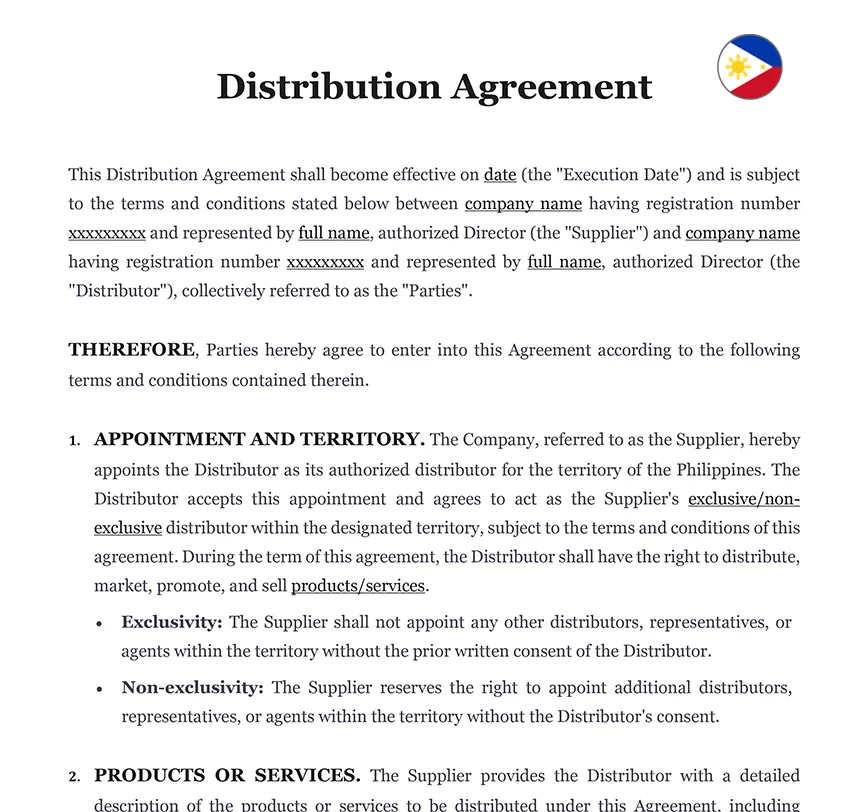Ready to use legal template
Drafted by experienced lawyers
Compliant with Filipino law
Ready to use legal template
Drafted by lawyers
Compliant with Filipino law
Home › Business contracts › Distribution Agreement
Learn more about Distribution Agreement in Philippines
Using a distribution agreement in the Philippines presents a remarkable marketing opportunity for businesses seeking to expand their product reach and capitalize on the vibrant local market. By partnering with reliable and established distributors, businesses can tap into their extensive distribution networks, market knowledge, and customer relationships. This agreement serves as a strategic blueprint, empowering businesses to effectively distribute and showcase their products to a wider audience. With the support of distributors, businesses can leverage their expertise in market penetration, promotional activities, and channel management, ensuring optimal product visibility and availability. Themis Partner guides you when drafting your distribution agreement by making sure its protecting your interests and compliant to the Philippines regulations.
Table of contents
-
What is a Distribution Agreement?
-
When to use a Distribution Agreement?
-
What should include a distribution agreement in the Philippines?
-
How can you choose the right distribution partner?
-
What are the legal requirements for distribution agreements?
-
What are the best practices for drafting a distribution agreement?
-
What tips and strategies can help in negotiating distribution agreement?
What is a Distribution Agreement?
A distribution agreement is a legally binding contract between a supplier or manufacturer and a distributor. It outlines the terms and conditions under which the distributor will sell and distribute the supplier’s products or services in a specific market or territory. The agreement establishes the rights and responsibilities of both parties, including pricing, payment terms, intellectual property rights, marketing support, and termination clauses.
In the context of the Philippines, a distribution agreement serves as a framework for the relationship between the supplier and the distributor in the local market. It ensures clarity and mutual understanding of expectations, rights, and obligations, providing a solid foundation for successful business partnerships.
When to use a Distribution Agreement?
A distribution agreement is typically used when a supplier or manufacturer wants to expand their market reach by partnering with a local distributor in the Philippines. It is beneficial for businesses looking to enter new markets or regions where they may not have direct access or sufficient knowledge of local regulations and consumer preferences.
Using a distribution contract is particularly important in situations where the supplier wants to maintain control over how their products or services are distributed, marketed, and sold. The agreement helps establish guidelines for the distributor’s activities and ensures the protection of the supplier’s intellectual property rights and brand image.
By entering into a distribution agreement, both parties can clarify their expectations, minimize potential disputes, and establish a mutually beneficial working relationship.
What should include a distribution agreement?
A distribution agreement in the Philippines typically includes several key components:
| ➤ Territory: Clearly define the geographic area where the distributor has the right to sell and distribute the products or services. |
| ➤ Products or Services: Specify the exact products or services covered by the agreement, including any limitations or exclusions. |
| ➤ Duration: Determine the initial term of the agreement and any provisions for renewal or termination. |
| ➤ Rights and Obligations: Outline the rights and obligations of both the supplier and the distributor, including pricing, payment terms, marketing responsibilities, and any exclusivity arrangements. |
| ➤ Intellectual Property: Address the protection of intellectual property rights, trademarks, copyrights, and any restrictions on the use of branding materials. |
| ➤ Performance and Reporting: Define the distributor's performance expectations, including sales targets, reporting requirements, and mechanisms for addressing non-compliance. |
| ➤ Termination: Specify the conditions under which either party can terminate the agreement and any associated notice periods or dispute resolution procedures. |
| ➤ Confidentiality and Non-Compete: Include provisions to protect confidential information shared between the parties and any non-compete clauses that restrict the distributor from promoting competing products. |




